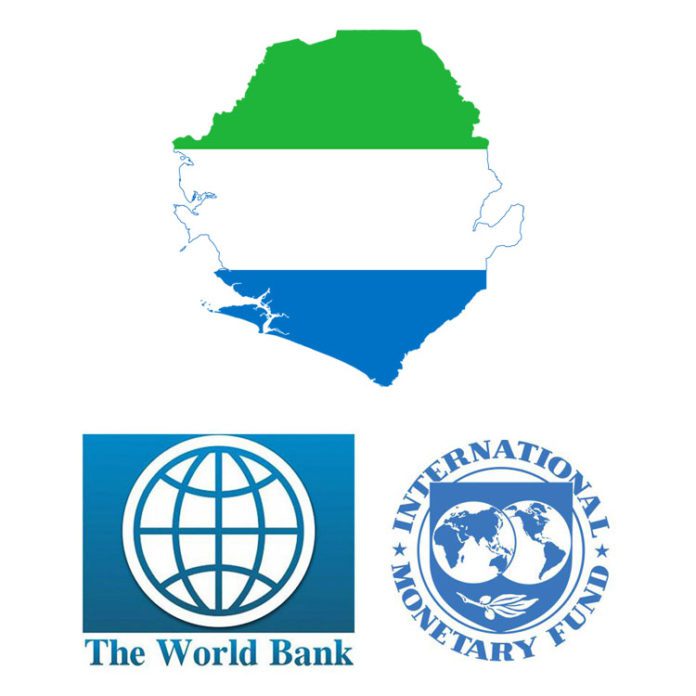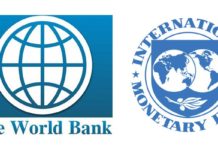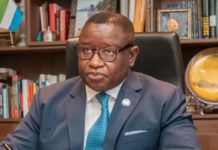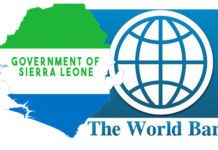
SIERRA LEONE GOVERNMENT MET IMF/WORLD BANK BENCHMARKS TO FIX THE ECONOMY, BUT SOME SEE MOTIVES OTHER THAN POVERTY ERADICATION
By Mahmud Tim Kargbo
The government of President Bio has made the usual pile of promises, none more capable of being foretold than their pledge to make the Sierra Leone economy regain its shape to grow faster. The economy is on IMF and World Bank oppressive life-supporting machines and most of our people are subjected to abject poverty due to years of political misrule. Even when the bulk of our exports is mainly raw materials, they would have us believe that economic growth is within reach. It’s now very clear that our current economic planners, politicians, and central bankers are unable to improve our economy to share the wealth as per natural resources and population by addressing the necessities of life for the suffering majority and closing the inequality gap.
But of all the promises made by our current political rulers over the course of these very harsh economic realities, none will be easier to keep for a fluctuating economy like ours with huge international debt that exports only raw materials. The truth is whether President Bio sustains governance or whosoever succeeds him as President of Sierra Leone will swiftly find that the key to faster economic growth isn’t something a president can decree. It might be wiser to accept the truth: The Sierra Leone economy is currently behaving badly. It is just being extraordinary considering the way this government has failed to effect established fiscal policies which are now affecting their ability in minimising poverty and close the inequality gap.
Unfortunately, these rulers’ policies—deregulation, privatisation or selling government properties or buildings, cutting taxes on fuel, or increasing electricity tariffs, increase tax rates that disadvantaged the contraption from investors and promote smuggling of our natural resources, cutting down budgets of basic amenities and rigid rules for monetary policy—proved no more successful at boosting productivity now and before. The current neocolonial financial institutions policies pushed in the throat of the Bio-led government have now prevented this government from improving the health conditions of its nationals, creating employment facilities by attracting genuine foreign investors, provide bread and butter for the poor majority than the statist policies that had preceded them.
Despite the fact that the language used by the Washington Caucus became more “development-friendly,” the conditionalities, interventions and self-serving restrictions introduced by Structural Adjustment Programme continue to frame the way that development operates only for the United States at our own detriment as we’ve been in this demonic partnership with the irresponsible policies of the IMF and World Bank for more than half a century with all the huge natural resources we are still poor. This necessitates the question if at all the so-called policies are good for development do you think the Washington Caucus would have introduced them to us? Why are they still reluctant to show us technology?
The conditions that came with the IMF COVID-19 pandemic loans hurt the poor. New loans under the current Structural Adjustment Programme keep essential human services, like primary health and education and access to safe water, out of the reach of the impoverished majority. These COVID-19 pandemic new loans are conditioned on requirements that countries limit government spending, inflate prices of essential commodities and changed trade and investment rules. Much of the debt our government own these architects of the hidden genocide (IMF/World Bank) against our people is a result of “bad faith” lending including
The practice of pushing loans on developing nations because the IMF and World Bank have too much money and had to knowingly lend it to corrupt governments for political or self-purposes. Lending with conditions ensuring profits returns to the creditors. Some debt also resulted from stolen wealth or loans that served the purposes of the elite and not for the general good. Other debt resulted from irresponsible projects that failed to serve a greater purpose or caused harm to our people or the environment.
Today, that is no longer good enough. Sierra Leone politicians expect the economy to be buoyant soon, not boring. Yet this expectation is shaped not by prosaic economic realities but by a most unusual period in history: In 2010, before President Bio took over governance, the country was struggling with an international debt of $1.4 billion that began whilst the economy was said to be booming and was projected as one of the fastest growing economies in the world when the world economy performed poorly than at any time before in our modern-day democracy. The victory of our economic boom was later followed by economic collapse hidden genocide against the people orchestrated and monitored by IMF and World Bank officials.
It was well effected with impunity by our own very politicians we elect with a sense of massive disregard for the plight of the majority and the rules of the land with respect to maintaining accurate checks and balances in all government financial transactions. To make matters worse, even the Auditor General Report recommendations meant to check corruption or financial misappropriation within state officials were deliberately not allowed to see the sun by our politicians under the supervision of the World Bank and IMF policies. This authenticates the fact that the IMF and World Bank policies and officials are aiding and abetting corruption in Sierra Leone.
The IMF and World Bank continue to give the same wrong economic medication to our present government. As I argue against the wilful wrong economic policies, the IMF and World Bank and our politicians continue to use in our country since we gained very weak independence till date, Sierra Leone, based on our natural wealth, we need a more comprehensive policy approach, involving pro-growth structural reforms, more balanced demand management (including higher fiscal spending on technology, education, health, agriculture and legal reforms to efficiently sustain checks and balances with punitive measures for defaulters and infrastructure) and better cross-border policy coordination and architecture. There is also a need, highlighted by the protracted Greek crisis, to address pockets of severe over-indebtedness, which can have a crushing impact extending well beyond the directly affected.
The emergence of a new consensus on these points by our politicians will be good news. But, in the current political environment, forming such a consensus and translating that consensus into action is likely to happen with sincerity, at best. The risk is that, as bad politics crowd out good economics, popular anger and frustration will rise from within, especially from those in social positions of trust who continue to benefit from corrupt activities at the expense of the suffering majority with impunity, making politics even more toxic. One hopes that enlightened political leadership takes the reins in time to make the needed mid-course corrections voluntarily, before unambiguous signs of the economic and financial crisis continue to force our policymakers to scramble to minimise the damage.
It is tempting to think that we know how to do better, that there is some secret sauce that the current Sierra Leone government can ladle out to make our economy grow faster than the norm. But despite glib talk about “pro-growth” economic policies, productivity growth is something over which fluctuating economies that are constantly under the radar of Washington caucus neocolonial financial institutions that partner with corrupt political governments around the globe have very little control. Rapid productivity growth has occurred in countries with low tax rates but also in nations where tax rates were sky-high. Slashing government regulations to satisfy so-called modern-day slavery Structural Adjustment Programme can’t in any sense lead to an efficiently independent economic nation.
As a matter of very important fact, this can be easily justified by the length of time, we’ve been together with the IMF and World Bank demonic Poverty Eradication Policies under its well-defunct Structural Adjustment Programme. With all the huge mineral deposits we own, the IMF and World Bank have refused so far to invest in genuine technology that will give us the required strength and advantage to process our minerals here in Sierra Leone and add value to them in order to export these minerals as finished products and improve on our economy.




